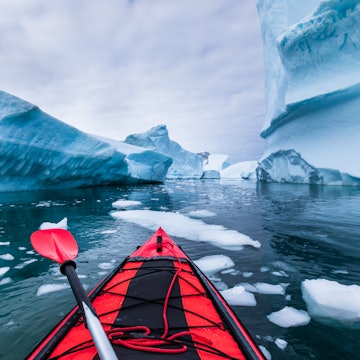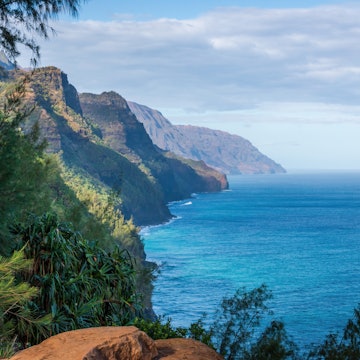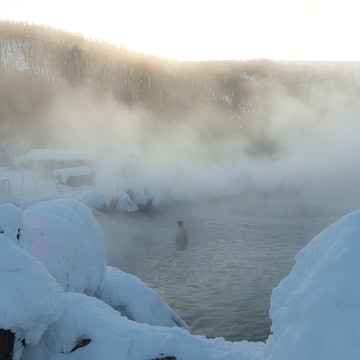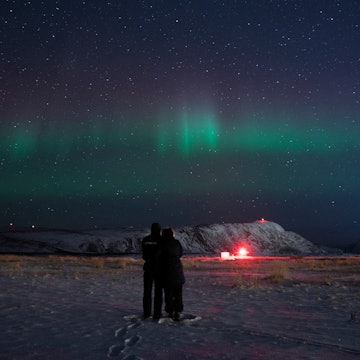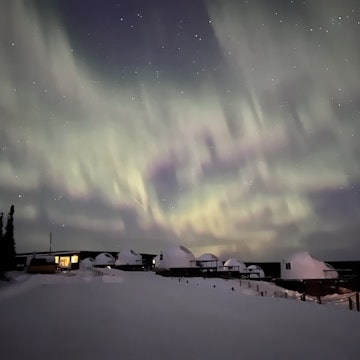
Anchorage's best museums showcase seaplanes, Alaska Native art and much more

Feb 12, 2022 • 6 min read

Performances and interactive events at the Alaska Native Heritage Center bring the state’s traditional culture to life © John Greim / LightRocket via Getty Images
Most visitors to Anchorage just pass through the city on their way to vigorous wilderness pursuits.
Yet scattered around the metropolitan area, more than half dozen museums offer a quieter, less energy-intensive way to learn about this lightly populated state. Here are seven places where you can encounter some of the stirring objects, traditions and stories that reflect Alaska’s unique character.

Anchorage Museum: best for art
Head and shoulders above any other in Anchorage and perhaps the best museum in Alaska, this cultural hub occupies a building made of reflective glass panels, set in leafy landscaped park that occupies an entire city block.
Inaugurated in 1968, the campus has been enlarged several times in the years since. The most ambitious extension took place in 2010 with the addition of a four-story mirrored structure (known as the “west wing”) that houses the Smithsonian Arctic Studies Center. The core of the museum’s offering, this encyclopedic collection of more than 600 Alaska Native objects is on long-term loan from Washington, DC, and includes art, tools, masks and household implements dating back as far as 130 years. Video exhibits documenting contemporary Alaska Native life complement the objects on display.
The building’s most recent extension is the Rasmussen Wing, added in 2017 to provide extra space for the museum’s burgeoning art collection. Its suite of galleries juxtaposes Tlingit carvings with the work of landscape painters such as Sydney Laurence, whose haunting studies of Denali date from the early 1910s.
In the original east wing downstairs is a kid-oriented Discovery Center focusing on introductory science and astronomy. On the floor above, the Alaska Exhibition tells the story of the territory-turned-state, tracing thousands of years of human settlement from early subsistence communities to the era of the oil pipeline.
Oscar Anderson House Museum: best for history
Positively ancient by local standards, this diminutive wood-paneled house perched on the western edge of downtown dates from 1915 and was one of the first permanent structures constructed when Anchorage was little more than a tent city. It was built by an enterprising Swede named Oscar Anderson, who arrived in Alaska from Seattle and subsequently went on to found numerous successful city businesses including a meat company and a coal mine.
Anderson lived in the house until his death in 1974 at age 91. After he passed away, the property was donated to the municipality and turned into a museum. Inside, period furnishings present a realistic freeze-frame of early pioneer life – so effective that it’s easy to imagine the late Oscar, back from a brief run to the corner store, suddenly appearing with a pipe in his mouth and a newspaper tucked under his arm. (Maybe that’s how the ghost stories started.)
Volunteers provide guided tours of the US National Register of Historic Places–listed house, which is open from May to September.

Alaska Native Heritage Center: best for live performances
Rather than static exhibits, this cultural and educational institution celebrates the Alaska Native groups who have inhabited these chilly northern climes for millennia through performances and stories. Spread over a wooded 26-acre on the Glenn Highway outside of downtown, it’s an essential stop for anyone with even a passing interest in Alaskan history.
The main building displays objects related to the region’s traditional ways of living, including kayaks, woven baskets, clothing and footwear. It also features diverse performances in the so-called “gathering place,” among them the staccato Alaghanak song, lost for over half a century. (The center collected snippets of the traditional song from tribal elders and reconstructed it.)
Outside, a reedy lake is ringed by several traditional dwellings, including an Athabascan family lodge, a southeastern Alaskan clan house and a sod-and-thatch Alutiiq home built partially underground. Guides explain the ancient architects’ artful technology, while totem poles and a giant gray-whale skeleton provide diverting backdrops. Dog-cart rides are available for an extra charge.
In summer, a complimentary shuttle bus takes visitors to and from the information center downtown.
Alaska Museum of Science and Nature: best for kids
Anchorage’s flagship natural-history museum is dominated by reminders of the terrifying reptiles that loom large in the imaginations of curious little ones: dinosaurs. As a result, you can expect chattering school groups, the odd birthday party and a cacophony of kids (on a bad day, screaming kids). Amid the chaos are interesting and educational exhibits, anchored by a replica of a full-sized pterosaur, an extensive rock and fossil collection, and a giant beluga-whale skeleton.
Situated slightly off the beaten track in the Mountain View neighborhood, this site is ideal for a rainy day – and, on any day, for children who need to let off some steam.
Alaska Public Lands Info Center: best free museum
Staffed by US National Park Service rangers, Anchorage’s Public Lands Center (one of four in Alaska) is a government-run information portal that doubles up as a mini-museum. Housed in the historic 1939 Federal Building, it’s an obligatory stop for aspiring hikers, mountain bikers and kayakers heading out into the wilderness. Most visitors stick around to peruse the mounted wildlife taxidermy, free movies, fun dioramas and huge maps; in the summer, storytelling rangers take the show outside through free guided walks around downtown. Note that you’ll need a photo ID to enter.
Alaska Aviation Museum: best for large-scale outdoor exhibits
Perched on the south side of Lake Hood (the JFK of seaplane “airports”), this museum catalogs the history of aviation in a state where flying is often the only means of transportation. Spread over several hangars and outdoor areas just a short walk from Ted Stevens International Airport, the indoor/outdoor site serves an homage to Alaska’s intrepid bush pilots and their sturdy planes. Displays explain milestones such as the first flight to Fairbanks in 1913 and the oft-forgotten battles against the Japanese in 1942–43.
Dotted around the facility are 25 vintage aircraft, a mix of bush planes, floatplanes, World War II craft and a retired Alaska Airlines 737. The closest you’ll get to flying one is in a virtual-reality simulator mimicking a flight in an Aleutian Tiger P-40, a single-seat US fighter from WWII.
Alaska Law Enforcement Museum: best small museum
Law enforcement is an ongoing challenge in one of America’s most crime-ridden states, where 1300 officers patrol an area one-fifth the size of the Lower 48. You can find out how the local cops get it done at this niche museum, run by the Fraternal Order of Alaska State Troopers and hidden amid a drab strip of shops in the middle of downtown. Historical photos, old uniforms, a CSI room and a zillion police patches crowd a small but richly packed space, a large portion of which is taken up by a beautifully restored 1952 Hudson Hornet police car.
You may also like:
Immerse yourself in Alaska’s beauty with these outdoor adventures in Anchorage
Anchorage brings cosmopolitan flair to the edge of Alaska’s wilderness
How to enjoy Anchorage for free, come sunshine or snow
Take your United States (USA) trip with Lonely Planet Journeys
Time to book that trip to United States (USA)
Lonely Planet Journeys takes you there with fully customizable trips to top destinations – all crafted by our local experts.
















